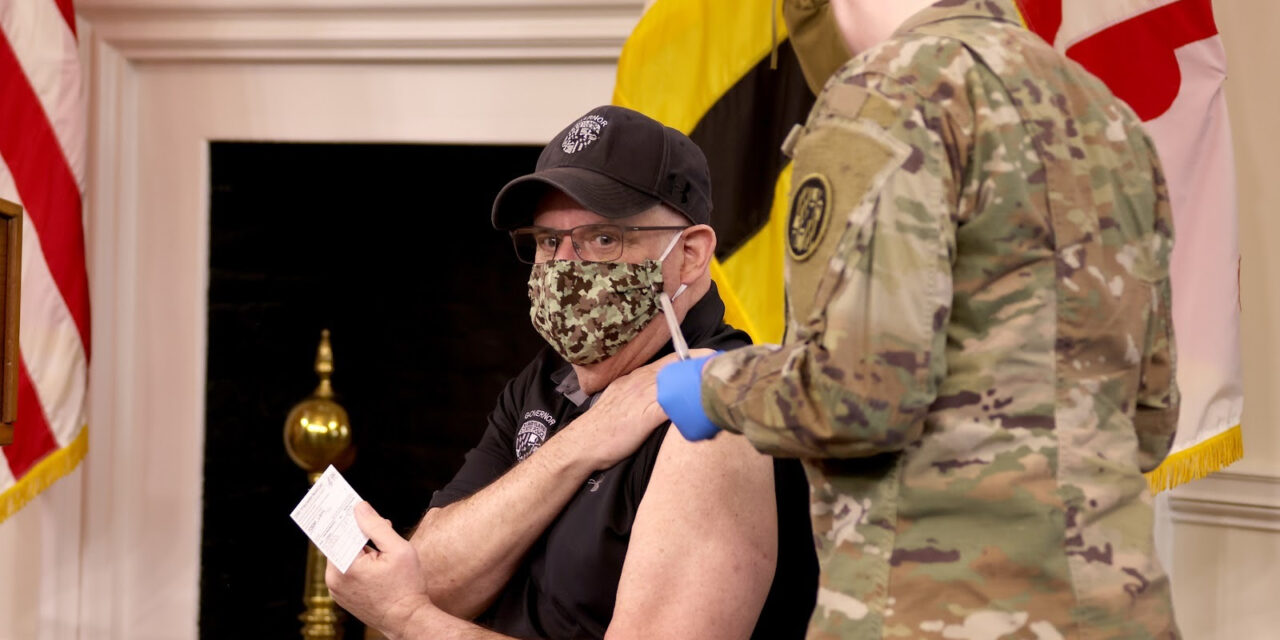Maryland’s July 19 Republican primary for governor is expected to pit former labor and commerce secretary Kelly Schulz against Trump-endorsed Del. Dan Cox, with anti-tax perennial candidate Robin Ficker also on the ballot.
Schulz and Cox have both represented Frederick County’s District 4, but the similarities end there. While Schulz was a star of the Hogan cabinet, Cox has made hostility to Hogan and his record one of his main campaign themes, even attempting to impeach the popular governor in March for supposed abuse of office. That move fizzled a brisk six minutes later when it drew no backing from members of either party on the House Rules Committee.
Del. Cox has taken his claims of Hogan malfeasance to the courtroom, too. And that’s why it should not pass without notice that the U.S. Court of Appeals for the Fourth Circuit, in an unsigned May 9 ruling without oral argument, upheld the dismissal by federal judge Catherine Blake of a Cox lawsuit claiming that Hogan had overstepped the law and the constitution in his use of emergency health powers in the COVID-19 pandemic. That lawsuit, which was joined by two other Republican members of the Maryland General Assembly, now appears likely to end with a whimper absent a bid for what would truly be a long-shot Supreme Court review.
The suit was among dozens filed around the country challenging pandemic orders, and some of the others prevailed at least in part. So why’d this one fall entirely flat? The divergence owes something to the state of Maryland law, which gives governors relatively robust health powers, and something to the weaknesses in Cox’s particular approach.
On the latter, to begin with, Cox’s filing unwisely chose to deprecate the seriousness of what it called the “alleged on going catastrophic health pandemic.” (It had already killed more than 2,000 Marylanders at that point.) Judge Blake showed impatience, writing: “even if these assertions were true, the plaintiffs ignore the likelihood that the restrictions that were put in place reduced the number of deaths and serious disability the State has experienced.”
Unfortunately, that was of a piece with Cox’s public pronouncements throughout the pandemic, which have gone far beyond mere skepticism into anti-vaccine themes, medical howlers of many sorts, and conspiracy-tinged viral content (arrest Bill Gates? Really?). Early on in the pandemic Cox claimed that “up to 70–86% of the public already have or had coronavirus,” and told a radio audience that “ninety-nine percent of the population is not in danger with this virus.”
Then there were the signs of hasty lawsuit drafting, which couldn’t have helped. One subhead in the original filing cited “Irreparable Injury To Plaintiffs From Governor Northam’s Gathering Orders,” comically echoing a suit filed earlier in a different state – Virginia — against Gov. Ralph Northam.
Along with its basic claims, the suit was decked out with rhetorical flights and what you might call ambitious theories of constitutional law, such as that the orders had had the effect of depriving Marylanders of a republican form of government. As the appeals court noted last month, Cox’s subsequent briefing did not go on to argue the merits of many of these theories, leaving Judge Blake free to dismiss them without discussion.
Claims based on the U.S. Constitution were always going to be an uphill slog because of the 1905 Supreme Court case of Jacobson v. Massachusetts, under which the Supreme Court had broadly upheld state and local government authority to act against epidemics as part of what is called the police power. Both liberal and conservative high courts have left Jacobson to stand as good law, and there is little indication that that will change any time soon.
Some legal challenges against pandemic orders succeeded on the basis of a narrower claim of statutory (not constitutional) overreach: a court might rule that a governor, mayor, or agency overstepped the lawful powers granted by a legislature. But Maryland gives its governor broader power than many other states, both for reasons of policy and because our part-time legislature, unlike the full-time ones that sit in some states, cannot practically keep the executive on too short a leash.
The General Assembly was not about to reconvene every few weeks to vote 30-day extensions of approval for one or another order. The judge found Hogan had not overstepped Maryland law. (Note also that the most controversial policy of all, prolonged school closures in some parts of the state, was a decision made by county-level officials, not by the governor.)
The Fourth Circuit panel upheld outright the judge’s dismissal of most of the suit’s claims, but gave separate handling to the claims regarding churches. This made sense in part because the intersection of freedom of worship with public health powers has been the one relevant area in which the Supreme Court has chosen to reshape constitutional law over the course of the COVID-19 outbreak, strengthening the rights of worshippers. In the case of these claims, the Fourth Circuit declared them moot – the restrictions are gone now, so further litigation would be pointless – thus neatly sidestepping the need to predict exactly where the current Supreme Court would land on the question.
In other words, the parts of the suit that did not strike out, timed out.
Delegate Cox will undoubtedly continue to work the campaign trail making strongly worded claims about the U.S. and Maryland constitutions as he understands them. Just remember that the actual federal courts keep making it clear that his ideas about the Constitution are not theirs.








Recent Comments